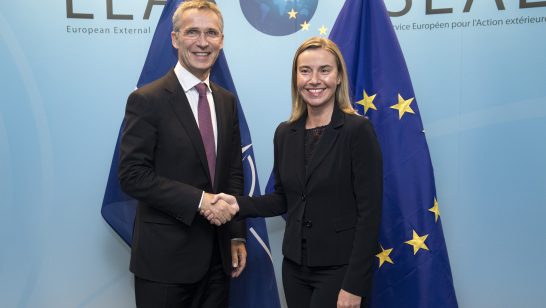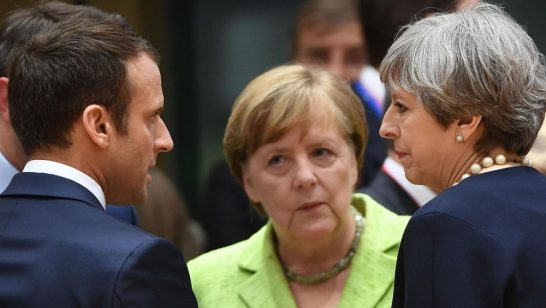
Does Berlin want to be the capital of a European Germany or a German Europe? That, according to many, is the question. But to the extent that it is, and there are voices disputing it, it is spurring too much debate about Berlin’s intentions and not enough debate about what the rest of Europe ought to be doing to help resolve it.
Today, Germany is, by dint of its economic and geographic position, attempting to provide leadership in Europe. It is doing so reluctantly and in the face of crises in Greece and Ukraine, either or both of which has the potential to destroy Europe as we know it. In that context, the question of interest ought to be not only how to sustain a European Germany but how to sustain a European project to which Germany can remain anchored.
Nowhere is this need clearer than in the debate on Greece. Germany is the rules hawk in the Grexit debate but is caught on the horns of a dilemma. If it persists with its current hard line, insisting that no debt relief is possible within the Eurozone despite contrary arguments from the IMF, it may yet force Greece out of the Euro and ultimately usher many more members, particularly in the south of Europe, toward the exit door.
The issue here is political dynamics, not economic or financial contagion. The European project has survived to date, despite severe disparities in what the Euro has meant for different national economies, only because of a certain degree of flexibility and solidarity between its members. If the Euro’s rules become synonymous with rigidity no matter what the circumstances and with German self-interest rather than European collective interest and solidarity, it is highly questionable whether the Left-Right mainstream consensus in favour of Europe that has existed in many countries for decades can be sustained.
At the same time, however, if Germany agrees to relax the rules associated with Euro membership in the absence of any action to address Europe’s deep rooted economic problems, the result could be a barely controlled free for all that undermines and destroys the credibility of the currency. Either way, it is the European project, not just Germany’s role in it that is at stake.
An equally acute dilemma exists in relation to Ukraine. At present, Germany’s response to Russian actions in Crimea and eastern Ukraine, consistent with the scepticism of all things military that has been a feature of the European Germany we have to come to know over the last seven decades, favours diplomacy and a unified European response based on economic sanctions. A more overt military response has been explicitly ruled out by Chancellor Merkel.
Whatever the merits of this position, and there are merits in the unity stitched together on sanctions across all EU member states, current German policy does not come without very significant risks. By making it as clear as she has that Germany sees no possible role for the military in this crisis Chancellor Merkel potentially invites the further Russian military escalation that she seeks to prevent. If sanctions fail to change Russian policy and Ukraine is left defenceless in a new phase of the conflict, moreover, then not only Ukraine but most other countries in the EU’s eastern neighbourhood may effectively be forced or intimidated into accepting a Russian sphere or influence.
On the other hand, Chancellor Merkel has been right to caution against those who have called for the US and other NATO countries to arm Ukraine directly. She correctly perceives that this would itself trigger a proxy Russia-West war and bring a significant escalation in Russian military engagement in Ukraine which neither NATO nor the US is willing to match.
Just as significantly, if the military and defence hawks in this debate were to be successful in having the arming of Ukraine become official US policy, this would create a split between Germany (and several others in Europe) and the US. NATO and EU unity in response to Russian aggression would begin to unravel, not only to Ukraine’s cost but to the cost of the whole of Europe. The core institutions of the European economic and security order, which form the heart of the Europe to which we want Germany to belong, would perhaps no longer be seen in Germany and many other parts of the continent as the foundation stones of foreign and security policy. Europe would probably descend, even more than it does today, into a series of ad hoc coalitions of the willing.
If both Germany and the rest of Europe want to avoid this outcome, and to sustain a European Germany in a European Europe, then it is incumbent upon all of us, and not just Germany, to think hard, and together, about what comes next.
On Greece, Germany must be persuaded, but also supported, in the belief that the real rules that matter in the Euro-zone relate to structural reform and growth, not debt relief. Greece will never pay back all of its debts. But it will also pay back none of them unless it moves out of austerity and into growth.
More evenly and widely distributed growth is also what matters across the entire Eurozone. Its current absence is a product of a failure to engage in necessary reforms over a long period of time. Even, and perhaps especially, a political and fiscal union of the kind being suggested by President Hollande in recent weeks, will struggle for legitimacy if the Eurozone cannot break out of austerity and achieve a reasonable level of growth.
With regard to Ukraine, it is highly unlikely that if left entirely defenceless the country will be allowed by Russia to develop into a prosperous and modern European state. To help it defend itself while not triggering a direct Russia-West proxy war, Germany’s allies should work with it to shape a cautious but more ambitious response. Training support to the Ukrainian military, along with support on developing the mechanisms to ensure that that military is fully democratically accountable should be the focus.
There are over 60 major arms exporting countries in the world, many of them not in NATO. Ukraine also has a large domestic defence industry. It can manufacture and buy the weapons it needs from elsewhere but the rest of Europe and the US can and should help with ensuring that those weapons go into a professional, modern and fully democratically accountable military structure.
Ukraine will also not survive without additional economic help. The rest of Europe should work creatively with Germany to make it easier and safer for more private sector investment to go in and for more people to easily move in and out. In this way, Germany’s concerns can be managed while the response it is trying to lead can be effectively enhanced.
The whole of Europe, not just Germany, needs to be engaged in shaping an effective European way of managing the crises facing the continent. If this happens, it will be obvious to everyone that a European Europe is here to stay and that a European Germany is an integral part of it. Any alternative outcome would represent not so much a German choice to depart from or change the character of the European project, but a failure of all European leaders to render it effective and worthy of popular support.
The opinions articulated above represent the views of the author(s), and do not necessarily reflect the position of the European Leadership Network or any of its members. The ELN’s aim is to encourage debates that will help develop Europe’s capacity to address the pressing foreign, defence, and security challenges of our time.



